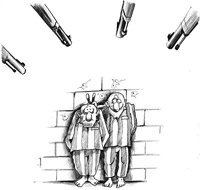In the middle of April when Tigran Sargsyan was just appointed prime minister of Armenia, he gave an interview to our newspaper. At that time Sargsyan was optimistic and thrilled by saying that the epoch of changes has arrived.
As a response to the question when we would feel these changes the newly appointed premier said, “I wish those changes took place today. I mean so you could believe me. If you believe it will be the first step. It means you will pass that impulse to your friends and relatives and it will be disseminated in the society. And this message will be delivered through the media.” Seven months have passed since that interview. Has anything changed? For some people yes and for others no. Everything is comparable. It all depends on the expectations and desires of the society. For example, recently by the order of the public television the Baltic Survey-Gallup conducted social polls. According to these results the majority of the Armenian society very much likes the current situation in the country and if things continue in the same manner they are ready to vote once again for the current government. They are satisfied of their state, the government and the authorities and among the most positive steps implemented by the government they emphasized the application of the computing monetary machines. Who would expect this? Nevertheless everything is comparative. For example the 35 million USD collected as a result of the recent Pan-Armenian Foundation telethon. On one hand we may be encouraged that instead of the 15 million USD of the last year this year the number is almost doubled. On the other hand, there is a feeling of slight disgrace because no matter how we name the process it is generally said money-begging. And begging of course is nothing to brag about. Or let’s take a look at our economy. It has been growing in dual-digit numbers for years but is gradually turning into a state with no industry and a state, which depends on the results and help of abroad. So we may both brag and criticize. It depends. Or let’s speak about the banking system. They say it’s a good one, developed but is not integrated with the international banking system. And due to that our economy didn’t abolish as a result of the international crisis and still remains a “stable harbor” in the “stormy ocean.” It was also comparative when the government was saying that the crisis was not affecting us. A little later during the presentation of the state budget it was revealed that we could hardly overcome the first wave of the crisis and that the second wave is ahead. So the government needs to undertake necessary steps to withstand the aftermath of the crisis. Moreover, “evil tongues” are saying that the government didn’t consider those effects when preparing the budget. And the reason is that prior to preparing the budget the crisis hadn’t started yet (or wasn’t realized quite well). And so Tigran Sargsyan decided to make a broad speech and present the anti-crisis program offered by the government. The interesting thing is that many political forces ignored this circumstance. The most surprising thing is the silence of Artashes Geghamyan if to take into account the fact that he had been offering an “anti-crisis” program years ago. Nevertheless, the government has contemplated certain steps to withstand the crisis. For example, simplification of tax administration, stimulation of domestic producers, financing of small and medium businesses. And as we witnessed they have relied a lot on the World Bank especially for the development of small and medium businesses. They were hoping to receive a chunky loan from them but they have forgotten about one important thing. In July of the current year president Serzh Sargsyan made a speech for the Baze members, asked the Armenian businessmen to make investments in Armenia and be involved in the prosperity process of the fatherland. The first person, who responded to the request was a Russian-Armenian businessman Samvel Karapetyan, who promised to make a 200-million USD investment in Armenia in near future. He also expressed his willingness to provide 50 million USD for financing a symbolic project. A number of other businessmen followed Karapetyan’s example. When listening to the news in the morning we even felt some concern about how we were going to fit hundreds of millions of dollars. But the “near future” noted by the businessmen doesn’t yet seem in the horizon. There is also no prospect of the much-spoken “dream” that hence it will be possible to easily buy a house and a car. Instead the impression is that the government is conducting a survival policy. And despite all this, the population continues to believe the government and especially the premier (according to the polls). “How productive will the activity of the prime minister be in the coming three years?” To this question 24.1% of the respondents answered “very productive” and 65.7% responded “moderately productive.” Thus the Gallup and the H1 make us believe that approximately 90% of the population believes in the premier. It is doubtful whether the pollsters know whether the premier won’t be changed for three years for sure. Perhaps they also don’t believe that the epoch of changes has come.

